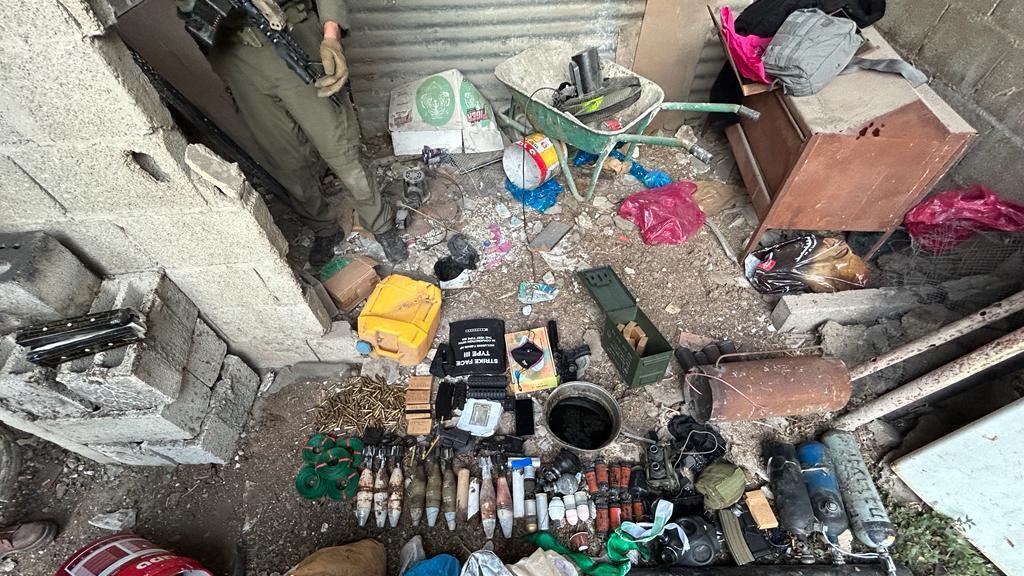Getting your Trinity Audio player ready...
Arresting wanted terrorists in Jenin
(Video: Israel Police)
Israeli officials say they plan to continue the operation in Jenin for another day in order to fulfill the goals for which they began it in the first place. Measurable security achievements have taken place, including the arrest of wanted terrorists, the destruction of terrorist infrastructure in the refugee camp, and the discovery of explosives laboratories and hidden weapons. But there are more goals that the security apparatus wants to achieve.
More stories:
Senior political officials say that the decision has been made to continue, while not ignoring the negative aspects of continuing such an operation, including damage to civilian infrastructure and causing harm to civilians.
1 View gallery


IDF and Shin Bet fighters located and destroyed a laboratory that contained hundreds of explosives and weapons
(Photo: IDF Spokesman's Unit)
At the same time, Palestinian Authority President Mahmoud Abbas on Monday evening announced the end of security coordination due to the operation. This is not the first time that the chairman of the PA has announced this - but Israeli officials do not take it lightly, and it is certainly one of the influencing factors in making the decision as to how far to continue the operation. Israel has no interest in bringing about the collapse of the Palestinian Authority.
In his first statement after the start of the operation in Jenin , and at the end of an assessment of the current security situation, Prime Minister Benjamin Netanyahu said on Monday evening that "in recent months, Jenin has become a haven for terrorism - we are putting an end to it." According to the prime minister, the IDF will continue the operation "as necessary."
Prime Minister Benjamin Netanyahu's speech at the US Embassy event at the Israel Museum
(Video: US Embassy in Israel)
Later, in a speech delivered at the US Embassy celebration of Independence Day at the Israel Museum in Jerusalem, Netanyahu for the first time announced the name of the operation – "Operation Home and Garden," although the IDF has so far refrained from defining the incursion in Jenin as an actual operation
Israel sent a message to the international community that there is not a single country in the world that will accept the existence of a sanctuary city that exports terrorism.
"Jenin is engaged in exporting terrorism. If we don't reach them in the Jenin refugee camp, we will meet them in the first stage against our forces, in the second stage in the settlements, in the third stage at the checkpoints and in the fourth stage in Afula and Tel Aviv," the officials told Ynet.
Israel is at the same time sending messages to Lebanon and Gaza: "Stand aside and do not interfere. The operation is limited to Jenin."
The security establishment has refused to specify the end date of the operation in Jenin, but is aware of the dangers that a prolonged stay in enemy territory could bring.
On Monday morning the IDF defined the operation in Jenin that began after midnight as a "division raid" only, and refrained from defining it as an "operation," but it soon became clear that it was not just a raid - a military move in which a force penetrates hostile territory, attacks and retreats - but rather a move that looks like operational on the battlefield.
About a thousand fighters of the IDF's commando brigade and infantry cruisers will begin their second day in Jenin in the coming hours, and no Israeli official is ready to commit to when turn back, after killing at least 10 terrorists, wounding over 70 and arresting dozens of terror suspects.
Meanwhile, thousands of Palestinians have left their homes and are fleeing on foot from the Jenin refugee camp. The Palestinians have charged that the IDF forced hundreds of civilians to evacuate their homes in the area near Al-Hassan Square in the city, calling through loudspeakers to evacuate the homes, and stressing that the families would be evacuated to the hospital yards and the Jenin City Hall.
Civilians evacuate Jenin
But security sources say that thousands of Palestinians left their homes on foot in the Jenin refugee camp, where 19,000 people live in an area of half a square kilometer, due to the presence of hundreds of armed terrorists and their fear of continued fighting. The Israeli sources added that the families were not required to evacuate by the IDF, but are doing so out of disgust and fear of the escalation in the camp
According to estimates by the Palestinian Central Bureau of Statistics, as of mid-2023 there were 11,674 Palestinians in the Jenin camp who are defined as refugees.




